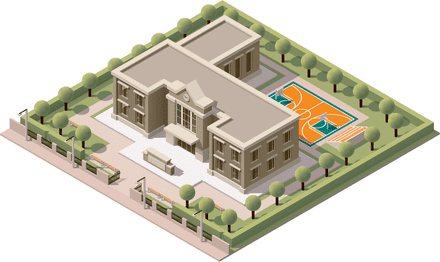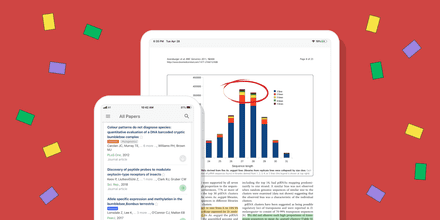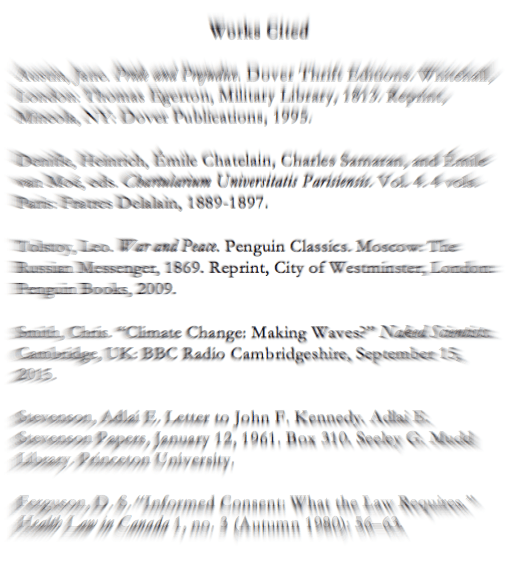
With Paperpile, citing journal articles and books has always been simple and straightforward. However, over time our support forum and inbox filled up with questions like: “How do I cite a medieval manuscript?” or “How do I cite an ISO standard?”.
We’ve updated Paperpile’s data model with two goals in mind: (i) remove any limitations and allow users with advanced requirements to correctly store and cite any research material they want and (ii) keep things simple and don’t introduce complexity for anyone else.
We also added support for citations in other languages than English. For example, a German student can write a Bachelor’s thesis in German and reformat citations and the bibliography with one click to submit it to an English language journal. Here are all the details.
New reference types
Coming from the biomedical field myself, I hardly ever cited anything but journal articles, books and occasionally conference papers. The situation is different for other fields like the humanities or social sciences.
We’ve always had (and still have) the “Miscellaneous” type, which can be used to store and cite everything that does not fit in any of the available categories.
However, with 14 newly added reference types, it should be easier to find the right category. That comes with the advantage that you can store all relevant citation data in dedicated fields and you can be confident that the citation is formatted correctly.
Here’s the complete list of all the reference types available in Paperpile:
| Type | Subtypes |
|---|---|
Journal Article | Research Article, Review, Editorial, Commentary, Letter to the Editor, Opinion, News, Erratum, Retracted |
Book | Monograph, Textbook, Booklet, Proceedings, Encyclopedia, Dictionary, Classical Work, Ancient Text, Fiction, Electronic Book |
Book Chapter | Monograph, Textbook, Dictionary, Classical Work, Ancient Text, Fiction, Electronic Book, Appendix |
News Article | Newspaper Article, Magazine Article |
Conference Paper | . |
Thesis | Ph.D. Thesis, Masters Thesis, Bachelor’s Thesis, Undergraduate Thesis, Habilitation |
Preprint Manuscript | . |
Website | Article, Database, Blog post, Forum post, Wikipedia, Tweet |
Patent | Patent Application, Utility Patent, Design Patent, Plant Patent, Reissue Patent, Defensive Publication, Statutory Invention Registration |
Report | Technical Report, Government Report, White Paper, Guideline |
Presentation | Conference talk, Seminar, Lecture, Reading, Poster presentation, Workshop |
Computer Program | Scientific software, Statistics software, Graphics software, Business software, System software, Programming language, Database, Script, Utility, Video game |
Manual or Documentation | . |
Personal Communication | E-mail, Letter, Conversation, Message |
Dataset | . |
Unpublished | . |
Miscellaneous | . |
Archival Material* | . |
Broadcast* | TV broadcast, Radio broadcast |
Audio* | Song, Concert, Podcast |
Video or Film* | Video, Online Video, Film |
Figure* | Image, Graph, Chart, Drawing, Photography |
Artwork* | Painting, Drawing, Sculpture, Calligraphy, Photography |
Musical Score* | . |
Grant* | . |
Standard* | . |
Map* | . |
Letter* | . |
Interview* | . |
Book or Film Review* | . |
Encyclopedia Article* | . |
New and updated data fields
We also carefully evaluated feedback on some existing reference types. Citations can get complex and we found quite a few cases where our previous model was too limited and could not produce the desired results. So we’ve added new data fields to existing reference types to cover these edge cases.
You can explore for yourself right in Paperpile. The button “Additional fields” shows all fields available for a specific reference types and comes with a short description:
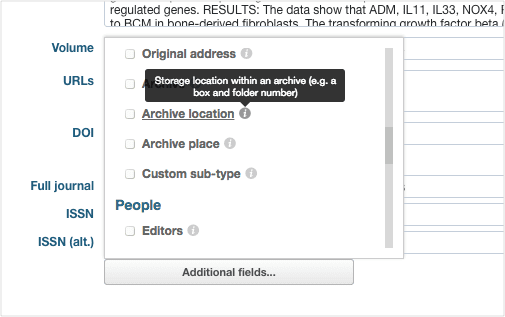
Here are a few examples of new data fields.
Original publisher
Some books have been re-published many times. In some fields, it is common practice to cite both the original publication of the book as well as the version one is currently using. We’ve added the fields “Original publisher”, “Original address”, and “Date of the original publication” to store the citation data for both versions. These fields can be also used to cite the translation of a book together with its original version.

Archive location
If you want to cite a document that is stored in an archive you can now do this using the fields: “Collection”, “Archive”, “Archive location”, and “Archive place”.

Free form publication date
Typically all you need to know about the publication date is the year to get a correct citation. Optionally you can store month or day in the “Date published” field. However, sometimes a reference has a non-standard publication date, e.g. “2014-2015” for a journal published biannually or “13th century” for a medieval manuscript from an archive.
It’s now possible to store arbitrary dates using braces: {2014-2015}, {13th century}. Paperpile will not complain about a date error anymore. Instead, it will use this information to generate a correct citation.
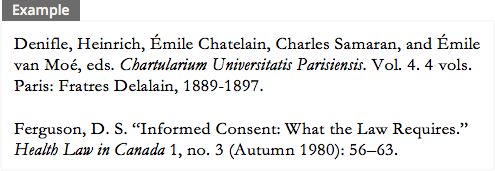
New identifiers
Different disciplines also have different databases, which come with different identifiers. We’ve added three new database identifiers for mathematicians and musicians:
- MR (Mathematical Reviews identifier)
- Zbl (identifier in the Zentralblatt MATH database )
- ISMN (international identifier for notated music)
Localization: write and cite in any language
Hard to believe for some of us, but sometimes you need to write a document in a language other than English. For example, you write an abstract in Japanese for a local conference, a Bachelor’s thesis to submit to a German University, or a French journal article for a journal that still publishes in French.
Paperpile now allows you to choose the language for your citations and bibliography. The language you choose will (i) affect typographic conventions like the type of quotes that are used and (ii) terms like “edited by”, conjunctions, and prepositions will be translated. Here are a few examples:
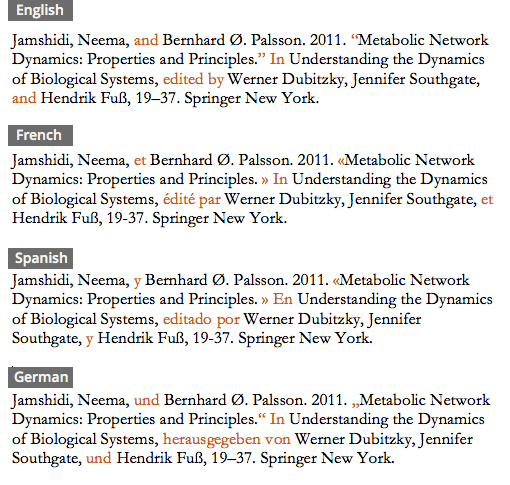
This is how you change the language in the Google Docs plugin:
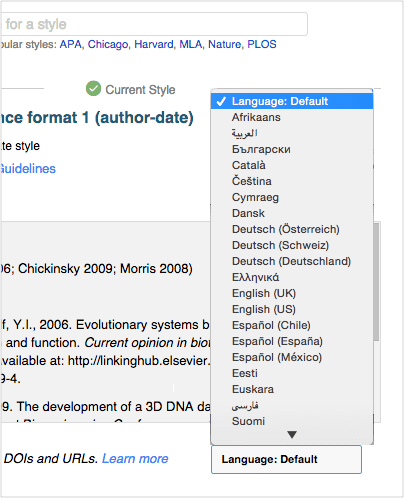
Some final notes
- We want to give credit to the Citation Style Project (CSL). Paperpile relies on CSL to format citations and this robust and sophisticated system makes it possible for us to offer all these new features.
- Some of the more advanced features we’ve introduced with this update are not supported by every citation style. So if you rely on these advanced features we recommend to use one of the well supported and highly sophisticated styles like “Chicago Manual of Style 16th edition (full note)”
- This update does not include reference types for legal citations such as “Bill”, “Case”, “Statute”, and “Treaty”. Legal citations can be complex and we will add support in a later update. If you have feedback for us about legal citations, please join the discussion on our forum: http://forum.paperpile.com/t/dockets-and-court-documents/290.
- All import and export functions have been updated to accommodate the extended data model. This affects import from Mendeley and Zotero as well as import and export from/to RIS and BibTeX.

